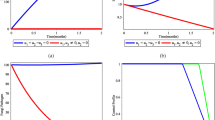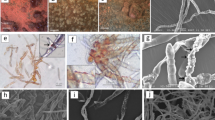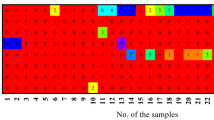Abstract
THE chocolate spot disease of beans (Vicia faba L.) caused by Botrytis fabae Sard. is so named because an early result of infection by the fungus is a small brown lesion on leaf or stem. In the course of studying the factors controlling the development of these lesions, it was found that the latent phenolase of bean leaves could be activated by certain pectic substances and by a soluble cellulose derivative in a way similar to that described by Kenten1 for anionic wetting agents. The result of phenolase action, with the naturally occurring leaf phenols as substrate, is an intense brown coloration.
This is a preview of subscription content, access via your institution
Access options
Subscribe to this journal
Receive 51 print issues and online access
$199.00 per year
only $3.90 per issue
Buy this article
- Purchase on SpringerLink
- Instant access to the full article PDF.
USD 39.95
Prices may be subject to local taxes which are calculated during checkout
Similar content being viewed by others
References
Kenten, R. H., Biochem. J., 68, 244 (1958).
Kenten, R. H., Biochem. J., 67, 300 (1957).
Tribe, H. T., Ann. Bot., N.S., 19, 351 (1955).
Author information
Authors and Affiliations
Rights and permissions
About this article
Cite this article
DEVERALL, B. Phenolase and Pectic Enzyme Activity in the Chocolate Spot Disease of Beans. Nature 189, 311 (1961). https://doi.org/10.1038/189311a0
Issue date:
DOI: https://doi.org/10.1038/189311a0
This article is cited by
-
Synthesis and bio-catalytic activity of isostructural cobalt(III)-phenanthroline complexes
Journal of Chemical Sciences (2015)
-
Obituary: Emeritus Professor Brian James Deverall, 1935–2014
Australasian Plant Pathology (2015)
-
Catecholase activity, DNA cleavage and cytotoxicity of six Zn(II) complexes synthesized from designed Mannich ligands: higher reactivity of mononuclear over dinuclear
JBIC Journal of Biological Inorganic Chemistry (2014)
-
Theoretical study of the catalytic mechanism of catechol oxidase
JBIC Journal of Biological Inorganic Chemistry (2007)
-
The catalytic cycle of catechol oxidase
JBIC Journal of Biological Inorganic Chemistry (2004)



